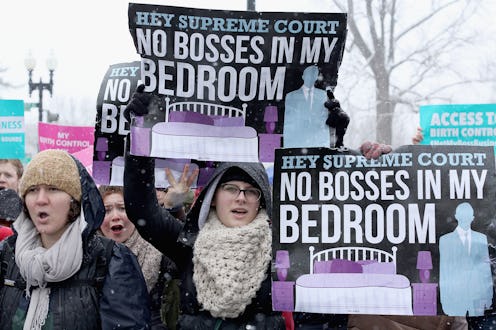News
Hero Justices Write Another Scathing Dissent
Ugh, and your blood had just changed from "boiling" to "unpleasant simmer." On Thursday the Supreme Court, in a Hobby Lobby-related case from Wheaton College, said the school didn't have to sign a form affirming their religious objection to paying for birth control and thus letting insurers or other third parties take on the payment. The college argued that the Obama administration's workaround, designed to allow Christian organizations to not be complicit in paying for birth control, still imposed a substantial burden on their religious beliefs. And the majority of the court agreed with them.
Instead, the Court said Wheaton could just send a letter to the Department of Health and Human Services explaining their objection. Guess who gets screwed in this scenario? Did you guess women? Ding-ding-ding. Still, the court only decided Wheaton's case Thursday, according to the Associated Press, and said it would take on other nonprofits later. (Spoiler alert: It's not looking good.)
The contraceptive mandate in the Affordable Care Act, after months of controversy and compromise, was specifically engineered to allow nonprofit religious organizations an out. All they have to do to exempt themselves from paying for birth control they don't agree with is sign a form and somebody else will make sure the contraceptive coverage is handled by someone else and paid for by someone else, too. Obviously that compromise wasn't enough; Wheaton and others say that because signing the form "triggers" payment for birth control (in this case, emergency contraception), it goes against their views.
And by the way, you're not the only one who realizes how completely messed up that is. In an unsurprising but still cathartic dissent from the Court's hero justices Ruth Bader Ginsburg, Elena Kagan, and Sonia Sotomayor, the Court's better third insists that signing the form, while it may run counter to Wheaton's views, isn't too much of a burden for the college. In fact, as Sotomayor argues in her dissent, joined by Kagan and Ginsburg, the form itself doesn't trigger anything; the law does, and it already exists. They also say the administration's compromise is "the least restrictive means of furthering the Government's compelling interests in public health and women's well-being."
Let me be absolutely clear: I do not doubt that Wheaton genuinely believes that signing the self-certification form is contrary to its religious beliefs. But thinking one’s religious beliefs are substantially burdened—no matter how sincere or genuine that belief may be—does not make it so.
Laws: Still not about making everybody, or even the majority, happy. In fact, they're there to ensure everybody's rights are protected. If you care about that, you should care about what's happening in the wake of Hobby Lobby.
